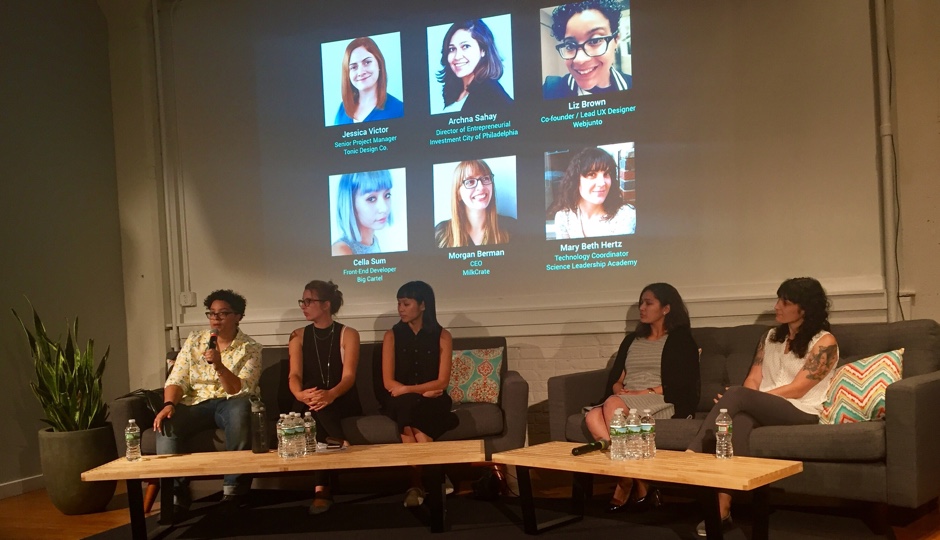Women in Tech Roundtable: “Philly Tech’s Gender Gap Is Rampant”

Photo by Fabiola Cineas.
Design firm Tonic Design Co., recently recognized by Inc. as one of the country’s fastest growing private companies, wants to join the conversation about how to get more women in tech. On Wednesday evening, the company welcomed about 100 guests into its East Callowhill office for its inaugural Women in Tech Roundtable.
“People say there are few women in tech all the time,” Jennifer Torre, senior quality assurance engineer at Tonic, told Philadelphia magazine, “but we want to know why this happens and exactly what we can do here in Philly to get more women in tech.”
Torre and her colleague Shannon Feck, an accountant at the company, both took nontraditional routes to tech — Torre has a background in language arts education, and Feck came from reffing women’s college basketball. During Philly Tech Week in April, the two got to talking about how male-dominated the tech scene is and decided to spur action at their own company.
“We love working at Tonic, and I feel lucky to have landed here because of the different career path I took,” said Feck. “This is all coming from a place of really wanting to get more women here, because this is an amazing space and we are missing out.”
Right now, only 16 of Tonic’s 59 employees are women. The company doesn’t currently have any hiring or recruiting practices in place to bring in more women, but they say hiring more women is a top goal of the roundtable. “We want to get ideas from the community and hear from women who took different career paths,” said Feck.
Tonic’s six-month apprenticeship program, which graduates a class two times a year, has also steered more women into tech. Torre learned quality assurance through Tonic’s apprenticeship. “It was a good path for me to learn how to build good code,” she said.
The discussion about women in tech isn’t new, and the gender gap is systemic. Women make up about 60 percent of the U.S. Labor Force, according to the U.S. Department of Commerce, but as numbers the Tonic team highlighted at the event show, at major tech companies women represent only about 16 percent of technical roles, 23 percent of leadership roles, and 29 percent of overall roles.
Wednesday evening’s panel focused on “middle school drop-off” — the point at which young girls lose interest in STEM education. Girls become disinterested in computer science starting in middle school, Torre and Feck told the crowd, citing a Girls Scout Research Institute study that found that 66 percent of six- to 12-year old girls are interested in computer science, compared to just 4 percent of women in their first year of college.
Tonic also announced its plans to launch a mentorship program in early 2017 that will support middle-school girls interested in tech through project-based programming.
Tonic brought together a panel of leaders in the tech space: Liz Brown, co-founder of Lead UX Designer and Webjunto; Archna Sahay, the city’s director of entrepreneurial investment; Mary Beth Hertz, Science Leadership Academy’s Beeber Campus technology coordinator; Morgan Berman, CEO of Milkcrate; and Cella Sum, a front-end developer at Big Cartel.
Here are some highlights from the discussion:
- “Don’t be afraid to give young women and girls challenges.” – Liz Brown on how girls need to be given more opportunities to solve problems.
- “You can’t be what you can’t see.” – Archna Sahay on how representation matters. If young girls can see a role for women in tech, it’s something they are more likely to work toward, she said.
- “We need to integrate computer science and coding into other courses.” – Morgan Berman on how we can get more girls to stay interested in tech. Imagine if you had to build a website for your history class, she said to the audience.
- “It’s important to know you’re not alone. If you think you’re alone, build a community.” — Cella Sum on why she stayed in tech. Sum was ready to leave the industry at one point but stayed after some encouragement from her mentor.
- “We need to change the mindset of boys.” — Mary Beth Hertz on how boys need to be included in the conversation. Young boys in school need to support their counterparts and be comfortable seeing girls do what is unfortunately traditional considered “boy things,” she explained. “Tech is for girls, too.”
Follow @fabiolacineas on Twitter.


